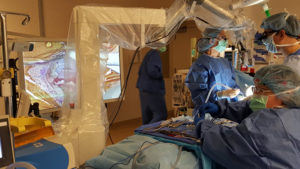-
Legacy Health neurosurgeons acquire advanced technology to chart more precise paths through the brain
Portland, OR (April 18, 2017) — Legacy Emanuel Medical Center is the first hospital in Oregon to acquire an advanced robotic imaging and navigation system for more precise brain tumor removal and spinal surgeries. The Synaptive BrightMatter™ technology integrates pre-operative imaging, surgical planning and robotic visualization to give neurosurgeons the ability to see relevant details in the brain not visible to the human eye, which may allow for much safer surgical intervention.
This audio clip aired on KXL FM News 101 in Portland, OR on April 17; it features Dr. Adler of Legacy Health speaking about acquiring Synaptive technology.

A neurosurgeon performing surgery at Legacy Emanuel Medical Center using the newly acquired Synaptive BrightMatter™ technology. This robotic visualization system consists of a movable arm with a digital video camera system and a high-powered microscope that follows the neurosurgeons sensor-driven tools. The incision area is projected in real-time on a 55-inch monitor screen. Photo by: Vicki Guinn.
During the pre-operative phase, neurosurgeons use the system’s whole brain tractography technology to create images to plan a safer route to reach a tumor. Having this roadmap ahead of time helps the neurosurgeons consider approaches for navigating around critical structures within the brain to reduce the chance of damaging or interfering with important language, visual and movement pathways. Also, neurosurgeons may be able to reach tumors once deemed inoperable or higher risk.
This announcement was covered in KATU News.
The technology’s robotic visualization system consists of a movable arm with a digital video camera system and a high-powered microscope attached that follows the neurosurgeons sensor-driven tools. The incision area is projected in real-time on a 55-inch monitor screen. The 3-D whole brain tractography image is there as well to guide the neurosurgeon’s instruments throughout the surgery. This hands-free optical visualization has an added benefit for neurosurgeons ergonomically ― typical surgical microscopes require more bending of the head and neck.
Legacy Emanuel President Lori Morgan, MD, says acquiring this technology aligns with Legacy Health’s vision to keep pace with innovative solutions to improve the patient experience. “These latest advancements in robotics and visualization put us at the forefront of patient care and furthers our commitment to provide quality care,” says Dr. Morgan. “More precise surgeries can result in better outcomes and shorter patient stays. In addition, the ergonomics of this technology requires less movement and can reduce or prevent physical stress and fatigue on our surgeons.”
Last year, Legacy Health performed almost 400 craniotomies (brain) and 1,600 spinal surgeries, with the majority at Legacy Emanuel.
About Legacy Health
Legacy Health is Oregon’s only locally owned nonprofit health-care organization with nearly 12,000 employees. Legacy includes Legacy Emanuel Medical Center, Randall Children’s Hospital at Legacy Emanuel, Legacy Good Samaritan Medical Center, Legacy Meridian Park Medical Center, Legacy Mount Hood Medical Center, Legacy Salmon Creek Medical Center, Legacy Silverton Medical Center, Legacy Laboratory Services, and Legacy Research Institute. Legacy also includes over 100 Legacy Medical Group primary care and specialty care clinics. Visit www.legecyhealth.org for more information.
BACK TO NEWS ARTICLES